My Pastor, The Rev. Canon Dr. Walter Bryce (Duke) Vipperman, died on Friday, 3 January 2020 from cancer at the age of 69. This is my eulogy of an ordinary, radical man.
The sun shone on the church steps as Duke shook hands with congregants emerging through the ornery wood church doors. I hung back until the flow of people stopped. I vented: “Church angers me. It makes me so upset. I hate Sundays!”
“Nooo!” Duke replied. Sundays weren’t supposed to upset me! “How can I help?” I said: “I’d like to read the Book of Job but can’t do it alone.”
“The LORD gave and the LORD has taken away; may the name of the LORD be praised.”
Job 1:21
A look of slight alarm came over him. He said what I knew: the beginning and ending were the good bits. “The middle is boring.” I saw his point. Did I really want to slog through a text with an injured brain that could hardly read? Yes, I did. Job was supposed to help me understand that God loved me and why God had allowed so much crap to fall on my head. I wanted to — no, I needed to — read the whole thing, beginning to end, including the vast yawning chasm of 34 brain-numbing, eye-glazing seemingly repetitive chapters.
“Okay,” he agreed enthusiastically. “You read a chapter and email me your thoughts. I’ll reply.”
That was Duke: despite his (and mine to be honest) horror of being bored, he plunged in to help me, anyway. He never abandoned his commitment to me.
Relief flooded me. Despite being able to lean on my pre-brain injury knowledge of the Book of Job, I faced the daunting challenges of damaged reading comprehension and my Go button being off — requiring a kind human being to get me going, ie, Duke.
Soon, we entered a rhythm. Each week I read a chapter. I searched for understanding on the web. I emailed him. And every weekend he’d drive his son to a weekly activity, happily zip into a local Starbucks, order a coffee in a tall, tall cup, settle down at a table with his laptop, and with relish open up my email. He’d tap out a reply, send, and be done in time to pick up his son and drive home.
The boring bits turned into an enjoyable conversation between the two of us where I wrestled with the question of why the innocent suffer, discover Job’s friends were like mine, grumble at the simplistic analyses I found, and he’d guide me with his wisdom, intellectual prowess, humour, knowledge of ancient Hebrew and translation issues, clear-eyed view of stereotypical Christian thinking, and patience.
Together we mined the richness of the boring chapters. Many months later, he encouraged me to create a six-week bible study plan and later an ebook based on it. He and I co-lead the group. He let me take centre stage! He had the authority and power, yet his humility meant he graciously released it to me who had none. And loved the fact the group had a ball. Even more amazing to me, he believed my ebook would sell well because of its teachings.
I’ve had many ideas. I’ve had people encourage me in my ideas. I’ve had people provide practical support with my books, whether editing or being the organizational and initiation parts of my brain. Duke, though, uniquely worked with me.
I am the Vine, you are the branches. When you’re joined with me and I with you, the relation intimate and organic, the harvest is sure to be abundant. Separated, you can’t produce a thing.
John 15:5 The Message translation
agapē: self-sacrificing unconditional love that transcends and persists regardless of circumstances.
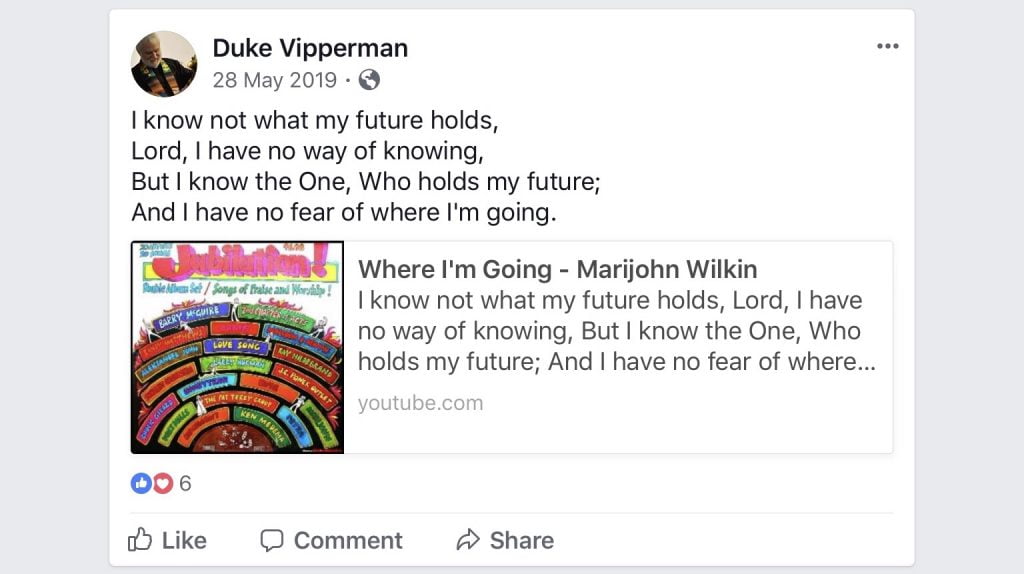
I know not what my future holds,
Lord, I have no way of knowing,
But I know the One, Who holds my future;
And I have no fear of where I’m going.
Resurrection
Easter is the main event in the Christian calendar, Duke told me, not Christmas. I puzzled over that. Christmas is a feast of festivities, gifts, and weeks of preparation. Easter is a weekend of chocolate bunnies. He said the Resurrection is why we follow Jesus. The Resurrection launched Christianity.
He prepared the church on Palm Sunday for Easter by having the entire congregation take a palm leaf and empty out into the streets in a long, cheering, singing parade. He wore his clerical cape over his traditional Anglican robes. It billowed out as he lead us round the block, guitar strapped over the generous layers of clerical fabric, leading the church, singing along. I rarely could walk the whole parade and often had to wait inside with the other frail and fatigued. But the instruments and voices sang their joy through the open doors as they left and returned.
That was Duke: worship was about music and joy in Christ.
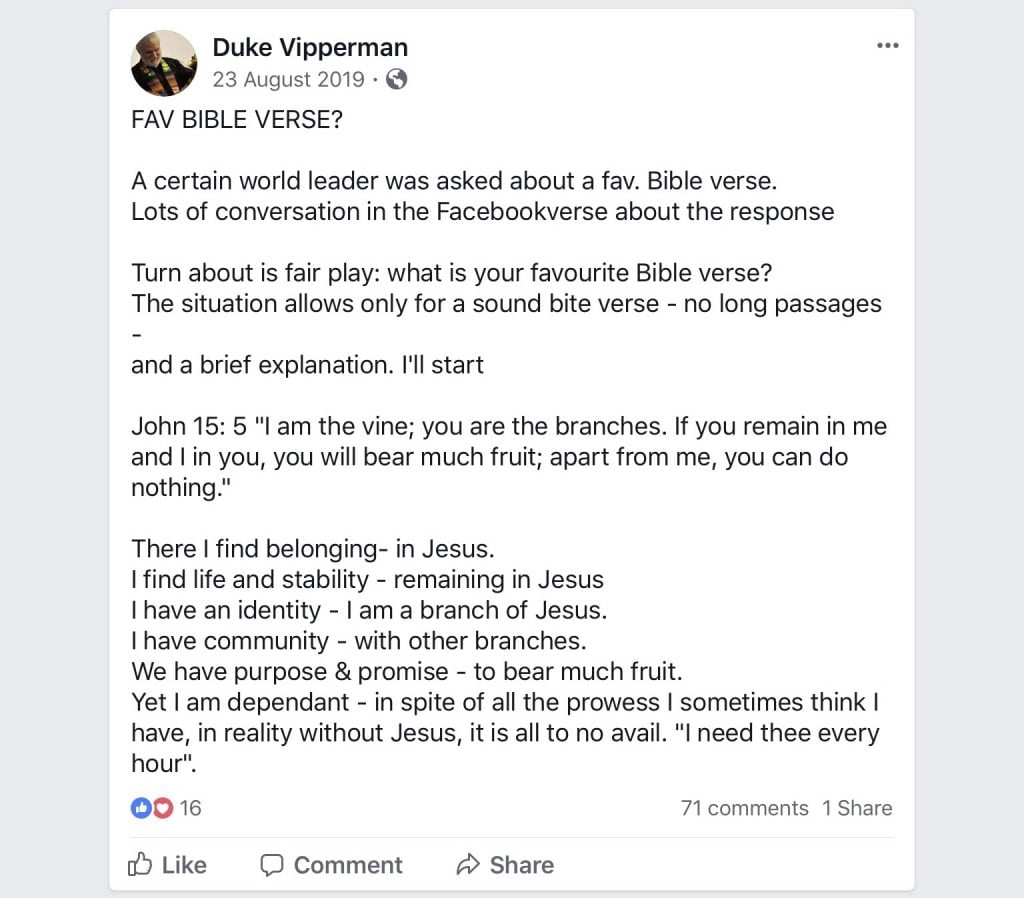
FAV BIBLE VERSE?
A certain world leader was asked about a fav. Bible verse. Lots of conversation in the Facebookverse about the response
Turn about is fair play: what is your favourite Bible verse?
The situation allows only for a sound bite verse – no long passages –
and a brief explanation. I’ll start
John 15: 5 “I am the vine; you are the branches. If you remain in me and I in you, you will bear much fruit; apart from me, you can do nothing.”
There I find belonging- in Jesus.
I find life and stability – remaining in Jesus
I have an identity – I am a branch of Jesus.
I have community – with other branches.
We have purpose & promise – to bear much fruit.
Yet I am dependant – in spite of all the prowess I sometimes think I have, in reality without Jesus, it is all to no avail. “I need thee every hour”.
The Church
Duke told me he saw himself as Pastor of a church, not a Bishop or a priest who works his way up the hierarchy. A man who wanted to stay with the people and lead them, as Jesus had commanded Peter to do: “Take care of my sheep.” Duke saw the church as it was in the 20th century and looked ahead to what it needed to be in the 21st if it was to become a place people went to for sustenance. That requires challenging the status authority and inertia of congregants.
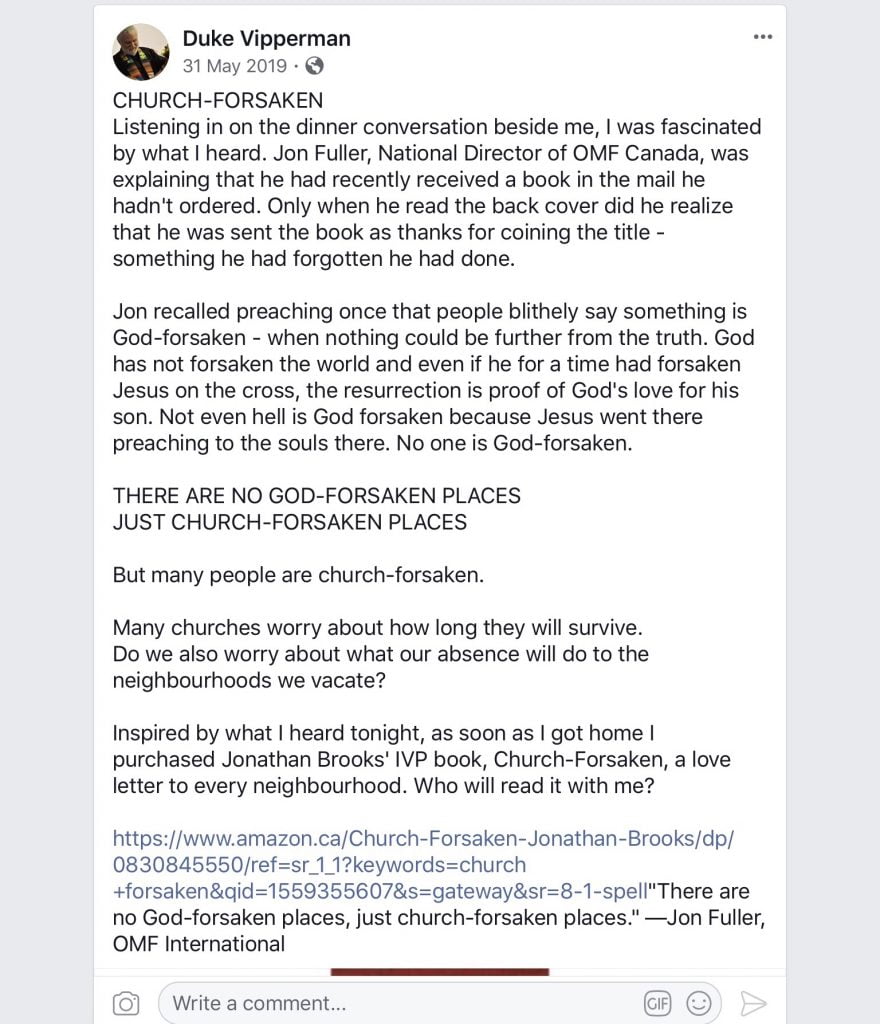
CHURCH-FORSAKEN
Listening in on the dinner conversation beside me, I was fascinated by what I heard. Jon Fuller, National Director of OMF Canada, was explaining that he had recently received a book in the mail he hadn’t ordered. Only when he read the back cover did he realize that he was sent the book as thanks for coining the title – something he had forgotten he had done.
Jon recalled preaching once that people blithely say something is God-forsaken – when nothing could be further from the truth. God has not forsaken the world and even if he for a time had forsaken Jesus on the cross, the resurrection is proof of God’s love for his son. Not even hell is God forsaken because Jesus went there preaching to the souls there. No one is God-forsaken.
THERE ARE NO GOD-FORSAKEN PLACES
JUST CHURCH-FORSAKEN PLACES
But many people are church-forsaken.
Many churches worry about how long they will survive. Do we also worry about what our absence will do to the neighbourhoods we vacate?
Inspired by what I heard tonight, as soon as I got home I purchased Jonathan Brooks’ IVP book, Church-Forsaken, a love letter to every neighbourhood. Who will read it with me?
Duke surprised me when he once confessed to me he didn’t like confrontations. Yet underneath his caring exterior was a challenging mind. The emptying of the churches occupied this mind. But unlike most Anglicans, he didn’t look to reliable, active church members for answers. Every summer, he and his wife Deborah visited various churches to see and experience the different. One church was dying. The forty-five left believed Duke was answer to their prayer.
Duke envisioned a bold plan to do a church plant there. He’d take 10 percent of the congregation of the thriving church he was Associate Rector at and lead them to the dying church in order to regrow it. But leading the many who trusted in Duke to follow him wasn’t enough. He had to find a way to sweep away the fustiness of stale traditions despite his antipathy toward confrontations. The tinny traditional organ gave way to an electric keyboard, drums, violin, and, of course, guitars. Acoustic guitars. Electric guitars. Multiple guitars with Duke joining in every chance he could. No staying in the seat reserved for the priest aloof from the music being made below him! The small robed choir disappeared in favour of young voices in jeans and T-shirts. A projection system appeared with announcements no longer in the bulletin but on the screen and with cool images to highlight his sermons. The ancient sound system was replaced when funds allowed. Up went a website and on to it an online questionnaire for all the new church members to find their spiritual gifts. Duke promoted it in bible studies and from the front of the church. A church can only grow when people bring their gifts to it. The Sunday School exploded from two, the former priest’s grandchildren, to multitudes spread throughout many rooms. And Duke welcomed every one of them at the communion rail.
Yet seniors and their sensitivity to amplified music, projected visuals, and cantankerous kids, also concerned him. He continued a long-standing bible study so that original as well as very old members always had a time with their Pastor, a place to learn in a quieter milieu. He famously used his Google skills and vast knowledge in midnight hunts for the perfect images or music or quotations to throw up onto a screen for the bible study, just as much as for the main service. (I miss those visual punctuations when other priests give their talks.) The bible study wasn’t an extra for him; it was a beloved part of his ministry. He tested out ideas there or just had fun.
I attended that study one day with my ex. He berated me afterwards for talking too much. Ashamed, I didn’t go back until Duke’s wife Deborah and Duke invited me several years later. I listened as well as I could through my brain-injury fractured focus; the men and women in their 80s and 90s had no problem with me speaking up. They were cool with however well or poorly I did. They enjoyed my ideas. That bible study and Duke’s office were the only two places I felt safe.
One memorable day, we sat in our accustomed chairs in our accustomed semi-circle, with the oldest in their sagging armchairs at the back against the wall. Duke suddenly came rushing in. “I’m sorry I’m late!” he exclaimed, panting. He launched into a lengthy apology over something to do with his thumb, I think, and why he was like six minutes late.
I sat there, my brain grinding to a halt as I tried to understand why he was giving such a detailed and long apology over something so trivial. Someone said, “No big deal, Duke.” We concurred. He disagreed. We finally accepted his apology.
And that’s when he explained he was modelling for us what an apology should be. He didn’t want us to pay attention to what the apology was for but how to apologize. That was to be our discussion topic.
I’ve never forgotten his lesson. It completely changed my ideas about apologies. And, for good or bad, moved me to no longer accept a hastily given, “I’m sorry,” followed by a change in subject. Unless it’s something really silly or trivial.
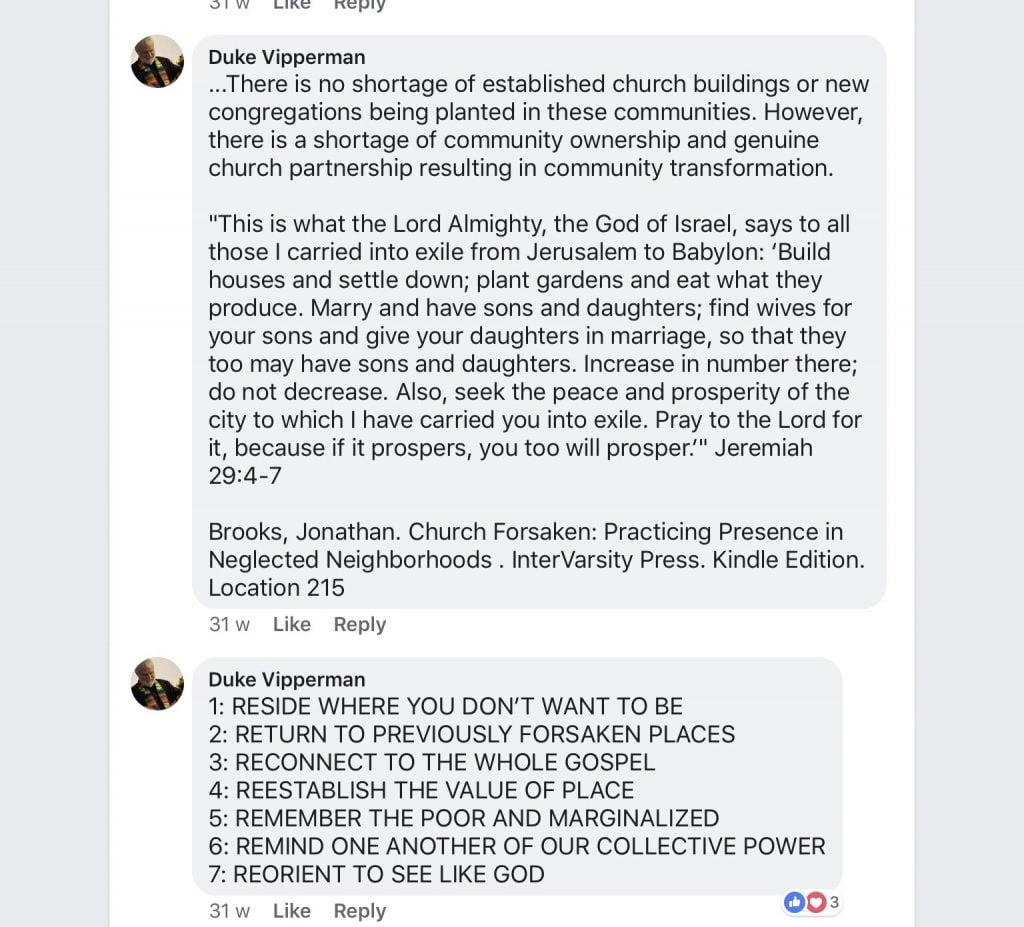
Duke Teachings
…There is no shortage of established church buildings or new congregations being planted in these communities. However, there is a shortage of community ownership and genuine church partnership resulting in community transformation.
“This is what the Lord Almighty, the God of Israel, says to all those I carried into exile from Jerusalem to Babylon: ‘Build houses and settle down; plant gardens and eat what they produce. Marry and have sons and daughters; find wives for your sons and give your daughters in marriage, so that they too may have sons and daughters. Increase in number there; do not decrease. Also, seek the peace and prosperity of the city to which I have carried you into exile. Pray to the Lord for it, because if it prospers, you too will prosper.” Jeremiah 29:4-7
Brooks, Jonathan. Church Forsaken: Practicing Presence in Neglected Neighborhoods. InterVarsity Press. Kindle Edition. Location 215
- RESIDE WHERE YOU DON’T WANT TO BE
- RETURN TO PREVIOUSLY FORSAKEN PLACES
- RECONNECT TO THE WHOLE GOSPEL
- REESTABLISH THE VALUE OF PLACE
- REMEMBER THE POOR AND MARGINALIZED
- REMIND ONE ANOTHER OF OUR COLLECTIVE POWER
- REORIENT TO SEE LIKE GOD
Duke didn’t rest in the success of his bold church plant idea. Every summer, he visited churches in other places and continents, searching for fresh ideas that he’d bring back to try.
I remember jumping into his cell church experiment. For a year, he attended the cell church I was in, and we all looked to him for leadership even though the idea of the cell church was about peers not so much leaders and followers. He sloughed off leadership to make it peership. For a year, I experienced Christianity as perhaps the early Christians had experienced it: sharing, caring, learning, teaching, growing towards Christ within a supportive small group of people. It sustained me during the difficult post-insurance settlement period of my life when I was in the, “now what?” phase. I had to face the reality of my brain injury, no more distracted by injustice stretched out. One of my pains was that I was unable to read the book Duke had given all of us as a prelude to starting cell church. I could only read bits and pieces of it and retain the information long enough to have some vague idea of what to expect. As usual, experience and Duke’s agile mentorship taught me.
Unfortunately, this experiment didn’t last. I felt Duke’s disappointment echoed within myself. Once again, I was faced with the problem of standard church. The standard church service overloaded my senses; made me shrink away from the crowd whenever I could; and presented me with the face of the kind of Anglican caring that when I blurted out during the exchanging of the peace that they couldn’t shake my hands because of my painful skin, their hand retreated lightening quick, their back my view, words of peace unshared. Thankfully, I was still in my flat affect mode and after the shock, I returned to the familiar neutrality of being, the kind of mode that perplexed people and that only Duke rolled with.
Agapē: listening to a person in a perplexing state talking about a tragic event and thinking about what she needed.
That was Duke.
Neighbours
For Duke, every person deserved a smile, a handshake, a comforting word. The middle class mother looking for a place to bring her kids, the woman abandoned in a foreign country looking for a place that loved her, the former alcoholic wanting to contribute, the devout Christian running the prayer chain. Or a man walking in to our bible study, sitting down in his fragrant clothes and half-absent eyes. “Hi! What’s your name?” greeted Duke. If the man needed professional help in the moment, Duke gently and patiently had it arranged. If the man was simply lost, looking for a place to belong, Duke continued the bible study to include him and we followed his lead.

THE SAMARITAN & YOUR NEIGHBOUR
Doing mercy does not earn you salvation.
Doing mercy is what salvation looks like.
His way of greeting people, welcoming them resonated with a few members of the congregation, mostly the older folk. They were the ones who came up to me to ask me how I was, who took an interest in my sputtering initiatives when my brain injury allowed me, who didn’t judge me or tell me, “your idea, you run with it,” for they knew, like Duke, that my brain injury wouldn’t let me “run with it.” He knew my propensity to push myself and would sometimes set limits. Duke self-admitted he didn’t like confrontation, but he found other ways to enforce his will. I’d feel rebellious, but I’d reluctantly admit to myself that he was right.
Duke didn’t have a fuzzy-rose view of people. Being soaked in Jesus’s teachings and agapē meant he could both perceive people’s real nature and extend love. “Doing mercy is what salvation looks like.”
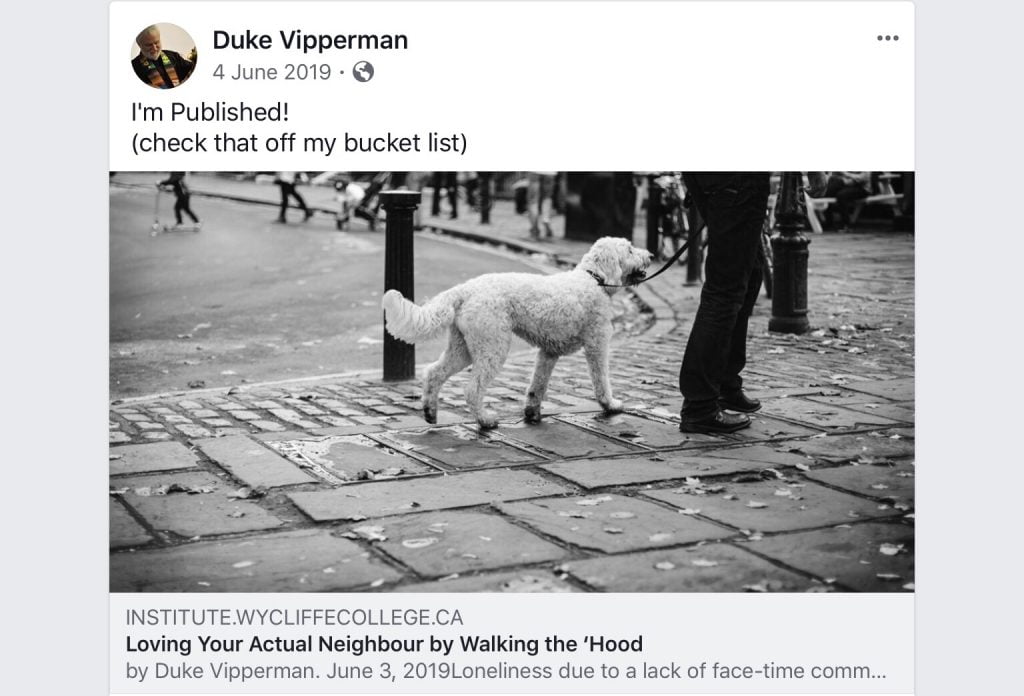
I’m Published!
check that off my bucket list)
Loving Your Actual Neighbour by Walking the ‘Hood
4 June 2019
The very first thing Duke thought about when he decided to regrow the church: walk the neighbourhood. Talk with the neighbours on the street, in the local notorious bar, in the coffee shops and barber shops. Walking the neighbourhood, living in the neighbourhood, meeting people where they were as they were, not demanding that they change before he’d let his church welcome them — these became central to his ministry and is why the planted church exploded into life.
Music
Music was Duke. He’d been in a band back in the 1960s. I love a robust organ. But Duke loves an energetic band. The church plant gave him the freedom to play guitar once more in a band — a band of loosely gathered people at the front of the church, some of whom re-found their lost love of playing music because of him. One day, years into the life of The Rez, the congregation in excited secrecy collected money to buy him a 12-string guitar. The day of the presentation, people shifted in their pews, trying not to jump up and down to scream, “Guess what we got you, Duke!” A sea of bright eyes and mouths that couldn’t stop grinning followed the lucky ones who got to present it to him as they walked up to where he stood at the top of the short flight of steps. His shocked reaction was all we needed. The applause and shouts to play something echoed off the old painted walls. A sigh of satisfaction became a hush of delighted listening as he tuned and plucked at the strings.
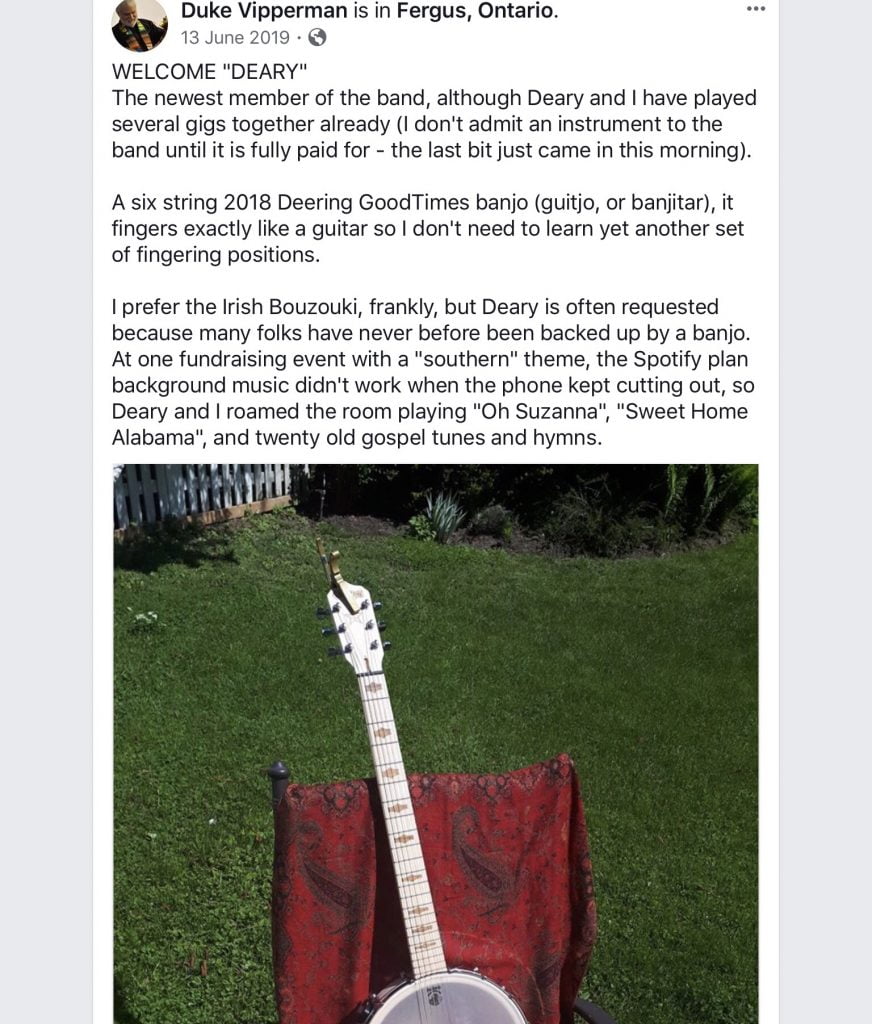
Welcome “DEARY”
The newest member of the band, although Deary and I have played several gigs together already (I don’t admit an instrument to the band until it is fully paid for – the last bit just came in this morning).
A six string 2018 Deering GoodTimes banjo (guitjo, or banjitar), it fingers exactly like a guitar so I don’t need to learn yet another set of fingering positions.
I prefer the Irish Bouzouki, frankly, but Deary is often requested because many folks have never before been backed up by a banjo. At one fundraising event with a “southern” theme, the Spotify plan background music didn’t work when the phone kept cutting out, so Deary and I roamed the room playing “Oh Suzanna”, “Sweet Home Alabama”, and twenty old gospel tunes and hymns.
13 June 2019
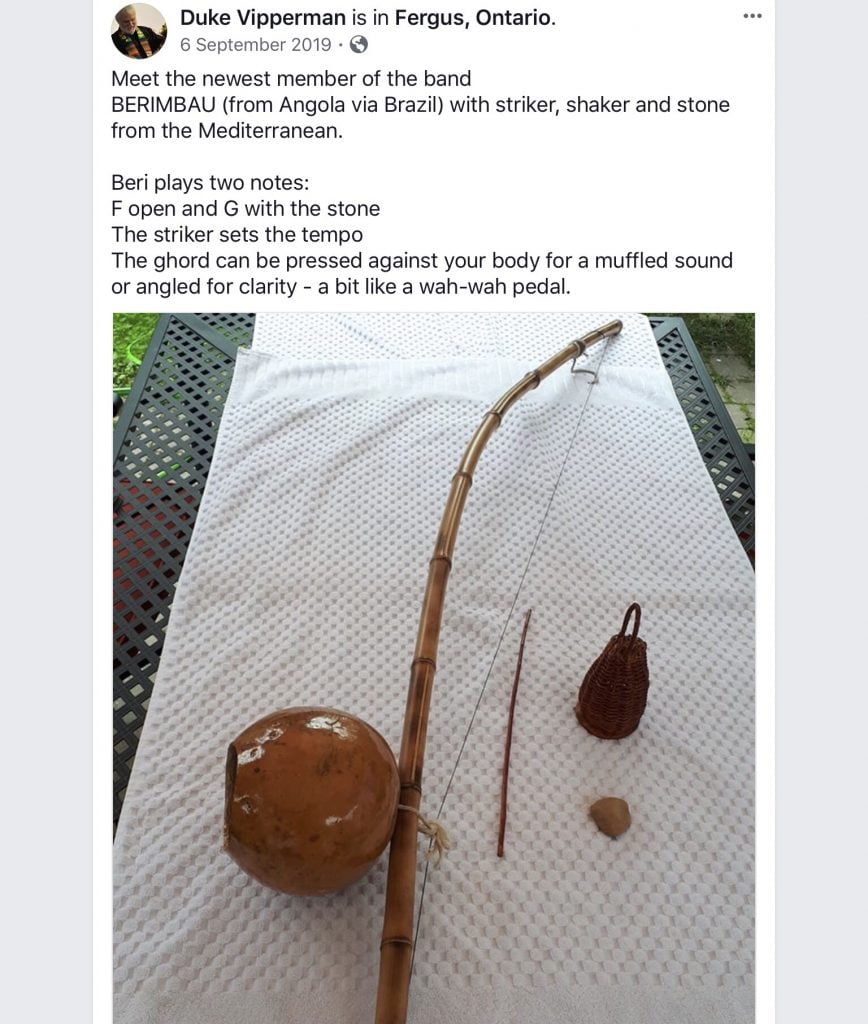
Meet the newest member of the band
BERIMBAU (from Angola via Brazil) with striker, shaker and stone from the Mediterranean.
Beri plays two notes:
F open and G with the stone
The striker sets the tempo
The ghord can be pressed against your body for a muffled sound or angled for clarity – a bit like a wah-wah pedal.
6 September 2019
Teachings
I have literally no one to talk to about intellectual ideas swimming around in my head now that Duke is gone. Duke delighted in learning. As a full-time Rector, past his forties, growing a church, pastoring hundreds of congregants, welcoming people from other churches into his bible study, he began studying for a Ph.D. I hardly computed it; as he neared the end of his studies, I’d improved enough to perceive what he was doing and be gobsmacked, both by his audacity and by not being deterred by how many years it was taking him. In 2012, I received experimental gamma-brainwave enhancement training. My intellect shot up. Duke was one of three people who noticed and suggested to me that I take a course. Because of my internal experience of brain injury, I’d been thinking for years about the mind. I enrolled in an Oxford short course in Philosophy of Mind and quizzed Duke on philosophy terms I was struggling to retain. He’d explain in the time he had; when I entered areas he hadn’t studied, he readily admitted he didn’t know. He recommended books (even Duke didn’t really understand how challenging reading was for me; but his interest in me made me want to try despite the headaches, failure, and fatigue). I began talking to him about graduate studies, about pursuing a Ph.D., like he had. “Go for it!” he enthused. I faced the insurmountable problems of lost reading ability and no funding plus fatigue. I thought I’d find a way and began searching. But other than Duke’s consistent, active encouragement, I found little moral support and no practical help. I quietly let the idea fade away into oblivion. Duke didn’t reproach me for giving up.
It seems like a cruel joke that now, in the very month that my reading comprehension has finally improved enough for me to read the kind of book Duke would recommend, he’s died. In all these years, I could only discuss based on my pre-brain injury knowledge, what I was good at gleaning from headline reading, my short-term memory retention, and my logic and reason. Now at last, I can begin to return to deeper thinking, and he’s gone.
Who will I talk to about philosophy, Jesus, religion, resurrection?
Who will get my Star Trek references?
Who will apprise me of Doctor Who episodes?
Who will hear me?
Who will work with me?
No one wanted to leave his funeral. The Postlude ended. The instruments and voices fell silent. The clergy waited at the back. Not a sound, not a movement. We all had the same questions as me, I’m sure. Who will be with us, now?
Loneliness
Standing next to me in his preferred simple Pastoral robe, Duke said: “Loneliness is the biggest disease we face in North America.” I felt seen.
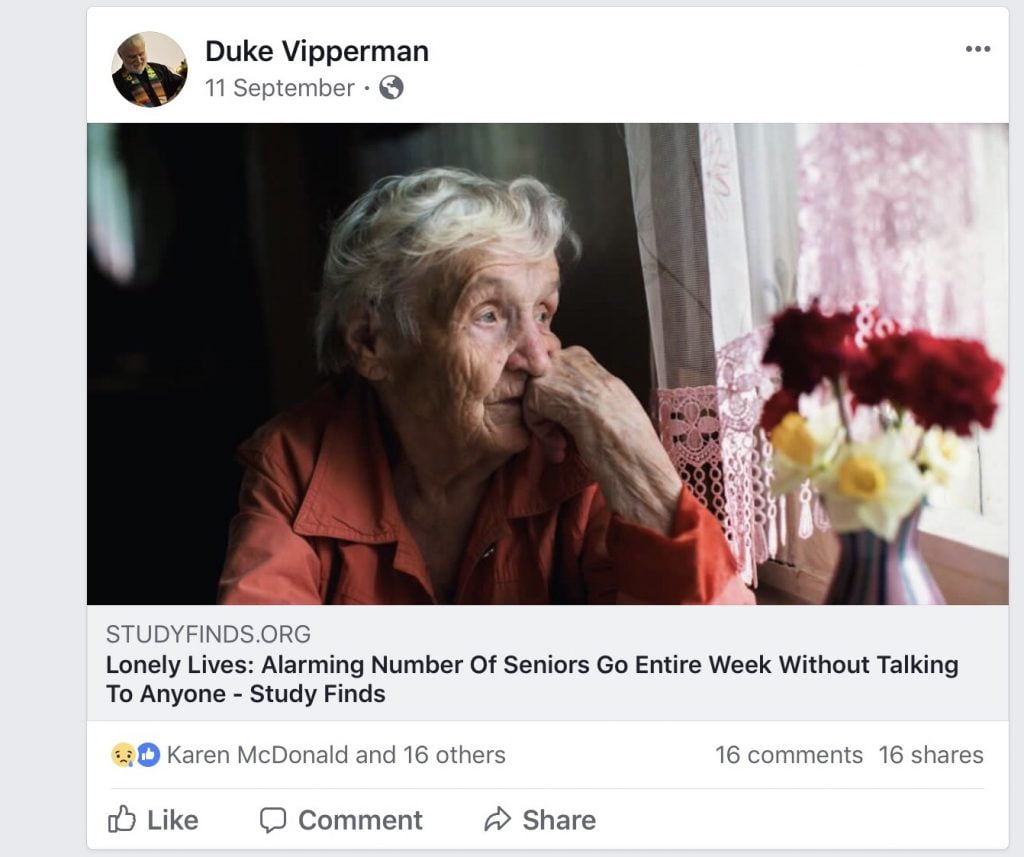
Lonely Lives
Duke posted this on Facebook on 11 September 2019. He’s dying, and the lonely continue to occupy his thoughts to the point of reading and sharing articles on us the forgotten. Sixteen of his hundreds of followers commented; sixteen shared this StudyFinds.org article.
Lonely Lives: Alarming Number Of Seniors Go Entire Week Without Talking To Anyone
Duke saw me, a person imprisoned in her home by her brain injury, family and friends abandoning her, angry at God and feeling sidelined by the church. So he came to my home. He sat on my couch, leaned back, crossed his legs, and listened intently as I stuttered out the latest crappy news, wondering how to cope. He said to me: “When your faith grows weak, Christians step in to be faith for you until you find yours again. It happens to all of us.” Relief!
As far as I know, no one I knew read up on brain injury, including Duke. But unlike most, although he found my flat affect and strange reactions perplexing, he rolled with them. He didn’t back away in horror or judgement even when he came to pastor me after my ex announced he was leaving me.
I’d only recently been diagnosed with closed head injury (aka concussion, mild traumatic brain injury) when I called him one night a blubbering, bawling mess. The next day, I was flatter than a calm sea with nothing living underneath its surface. The following day when he was able to come by, I was in my happy neutral mien. That threw him. He told me later that in all his years he hadn’t found a person in my situation in my kind of outwardly happy mood. He was usually having to pick them up off the floor, so to speak. But he didn’t let on his discomfiture and puzzlement at the time. Instead, he let me talk. And best of all, he offered to take me out for coffee on the day my ex was leaving so that I would, in effect, be leaving my ex, not the other way around. I leapt at his offer. I wouldn’t have to face the physical act of rejection.
I cannot overstate how incredibly kind, generous, caring, and seeing-me that was of him. I wasn’t alone on the loneliness day of my life.
Agapē: seeing the need, reaching in without forcing the hurting person to ask first, thinking about how to bring healing, offering solace, protection from harm, and a place of belonging.
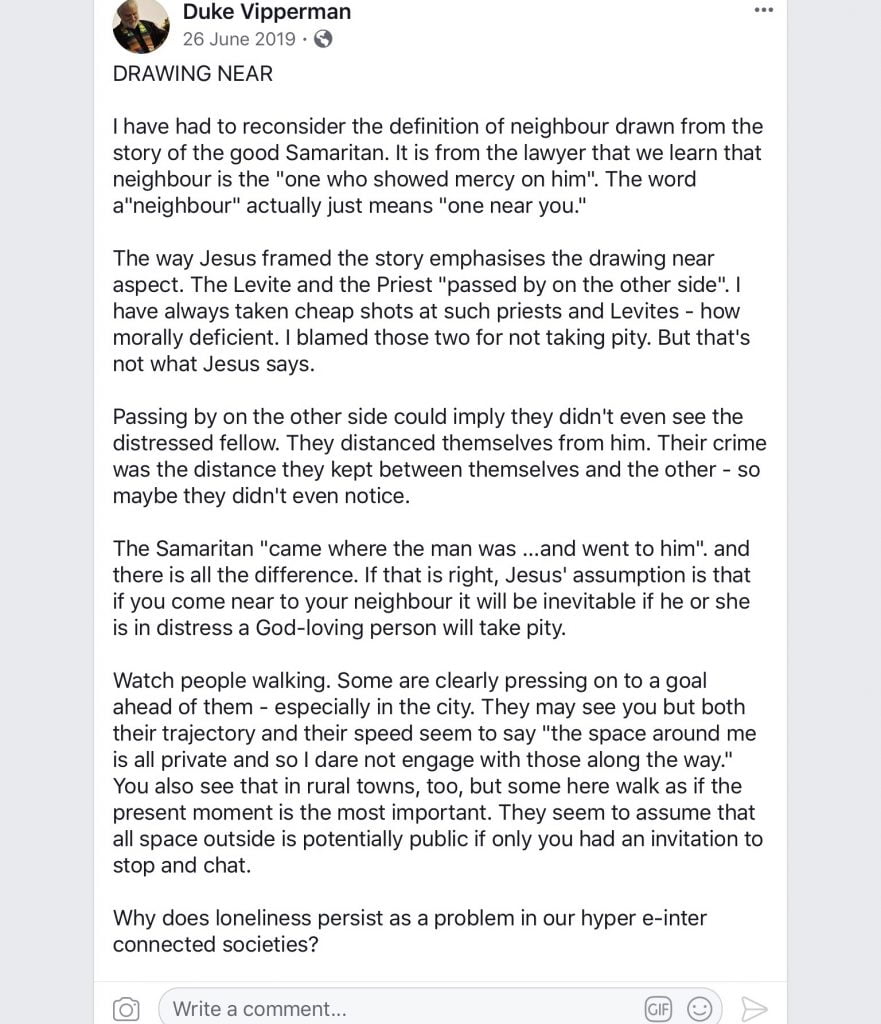
DRAWING NEAR
I have had to reconsider the definition of neighbour drawn from the story of the good Samaritan. It is from the lawyer that we learn that neighbour is the “one who showed mercy on him”. The word a”neighbour” actually just means “one near you.”
The way Jesus framed the story emphasises the drawing near aspect. The Levite and the Priest “passed by on the other side”. I have always taken cheap shots at such priests and Levites – how morally deficient. I blamed those two for not taking pity. But that’s not what Jesus says.
Passing by on the other side could imply they didn’t even see the distressed fellow. They distanced themselves from him. Their crime was the distance they kept between themselves and the other – so maybe they didn’t even notice.
The Samaritan “came where the man was . . . and went to him”. and there is all the difference. If that is right, Jesus’ assumption is that if you come near to your neighbour it will be inevitable if he or she is in distress a God-loving person will take pity.
Watch people walking. Some are clearly pressing on to a goal ahead of them – especially in the city. They may see you but both their trajectory and their speed seem to say “the space around me is all private and so I dare not engage with those along the way.” You also see that in rural towns, too, but some here walk as if the present moment is the most important. They seem to assume that all space outside is potentially public if only you had an invitation to stop and chat.
Why does loneliness persist as a problem in our hyper e-interconnected societies?
26 June 2019
Loneliness happens partly because you feel you don’t belong anywhere. The one place I felt I belonged was in Duke’s office and in the bible studies he lead. I didn’t and don’t feel I belong in the church. For unlike Duke, the church doesn’t see me as lost, in need of being reached in to, I want to contribute but need practical help to do so. That is probably why one of the Pastors who succeeded Duke had no compunction in saying to me, “if you want to be part of a small group, call back when they start up again” right after I’d told them that with my initiation deficit, it took me over a year to call them for help and I probably wouldn’t be able to call again, so could they reach out, please?
Resurrection
The idea to write a play on the Resurrection implanted itself in my mind. I didn’t know why, other than society’s over-focus on Jesus’s death. I thought I’d write it during Camp NaNoWriMo 2019, but I felt a resistance as if God didn’t want me to yet. Then suddenly it was time. November NaNoWriMo would be when. I hadn’t spoken to Duke since his “rewirement,” but I thought of how he’d guided me before.
One time he sat at my kitchen table as we hashed out the character of Jesus. He came to where I was because of my health. He didn’t demand that because of his responsibilities, who he was, and his obviously superior knowledge that I go to him. Kind of like Jesus crossing the Sea of Galilee to release a man from a legion of demons.
This past September, thinking back on his generosity, I obeyed the impetus and called. His cheerful, vital voice, his immediate response to teach and advise, brought past collaborations into the present. I wrote notes. I asked questions. I could tell something was off, but I didn’t ask. A final question grew in my mind; it pushed at my lips; it wanted out. I asked, feeling fearful at my impudence yet unable to resist: “What does the Resurrection mean to you personally?”
He answered. He’d told me stories over the years about his growing up, times in his early life in Canada, but this was the first time I heard him speak from the very essence of his being, from deep within his heart, revealing vulnerability. His answer so profound lifted my heart and wet my eyes. I had the key to my play. The beginning and the end. Perhaps I had an answer for myself, too, for the misery of the last twenty years.
Resurrection was the main event. Resurrection was why though Duke wanted desperately to live, he did not fear dying. Duke’s soul stayed firmly with Jesus.
He ended our call with his so familiar upbeat enthusiasm: “Keep phoning any time. If I’m not in the mood, I’ll let you know.”
I did.
He reminded me to read anything by N.T. Wright on the Resurrection. I borrowed Surprised by Hope from the Toronto Public Library and read the bits most relevant to my writing because that was all I could cognitively do.
My last conversation with him was in November when I shared the good news that I’d finished Resurrection, The Play. His reply: “Yay!” I can hear his voice rising into that familiar higher register of celebration.
His last words to me: “It was a pleasure working with you, Shireen.”
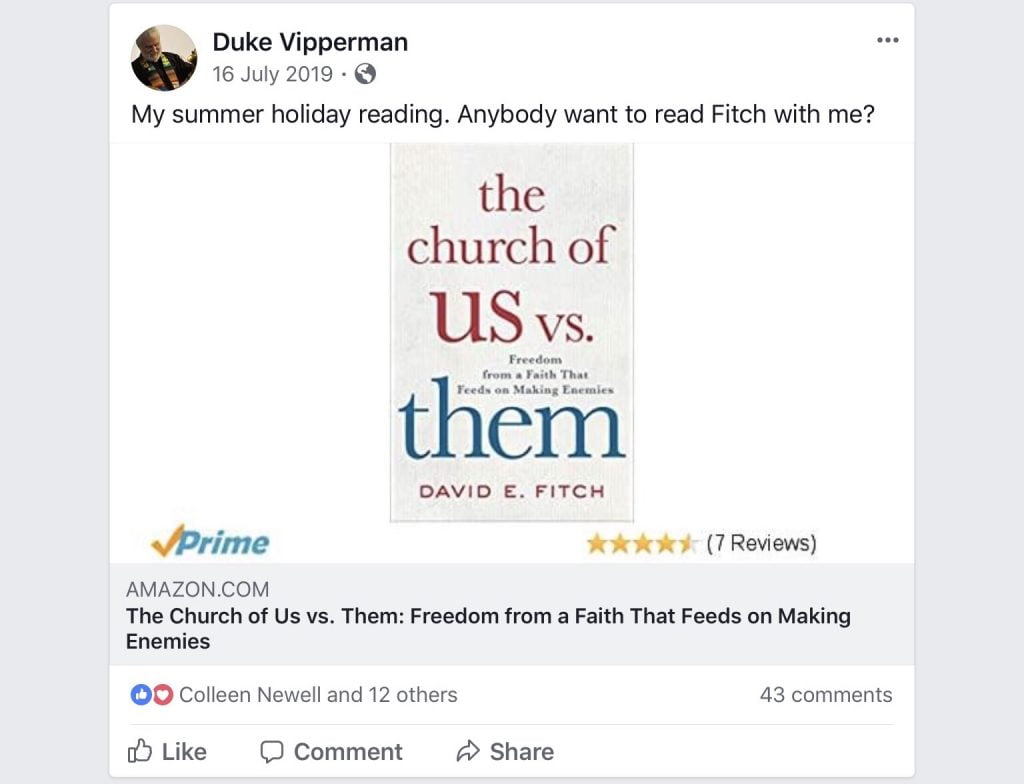
My summer holiday reading. Anybody want to read Fitch with me? 
Sound analysis from the UK that fits NA 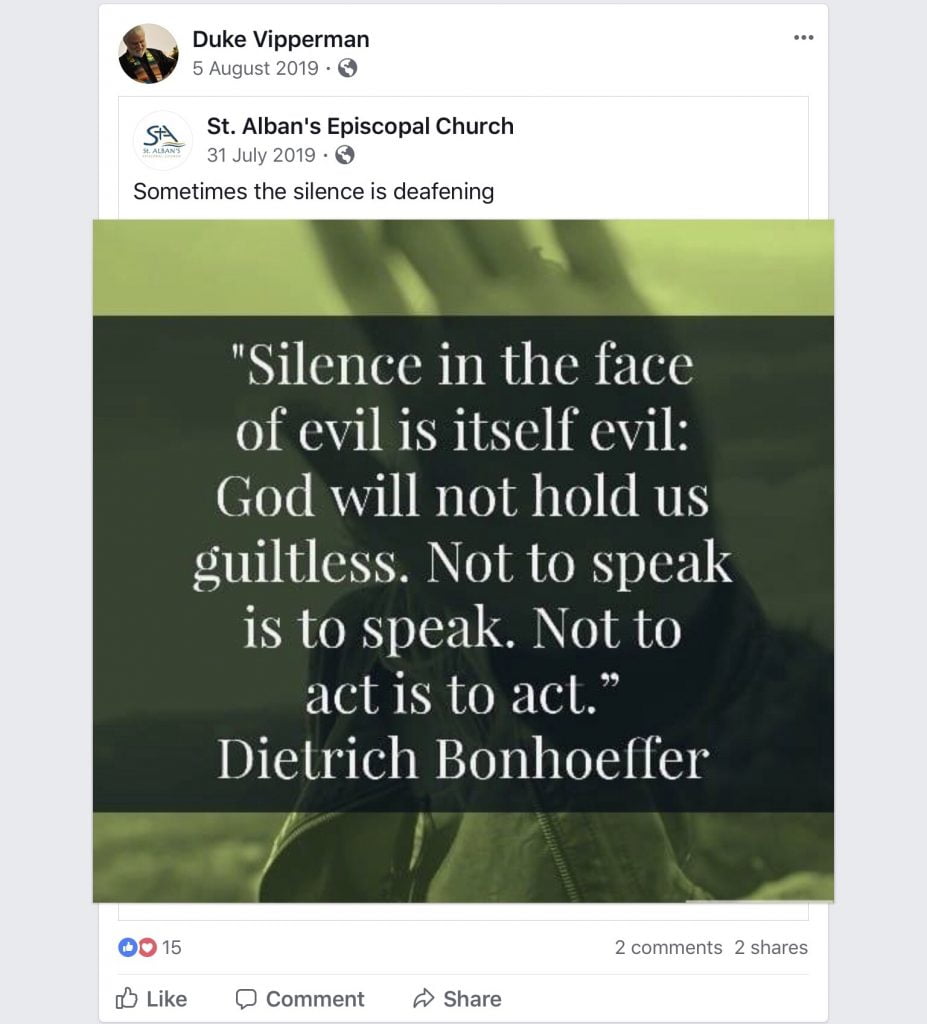
As with the whole world, I am grieving deeply the tragic loss of life to gun violence n the US. 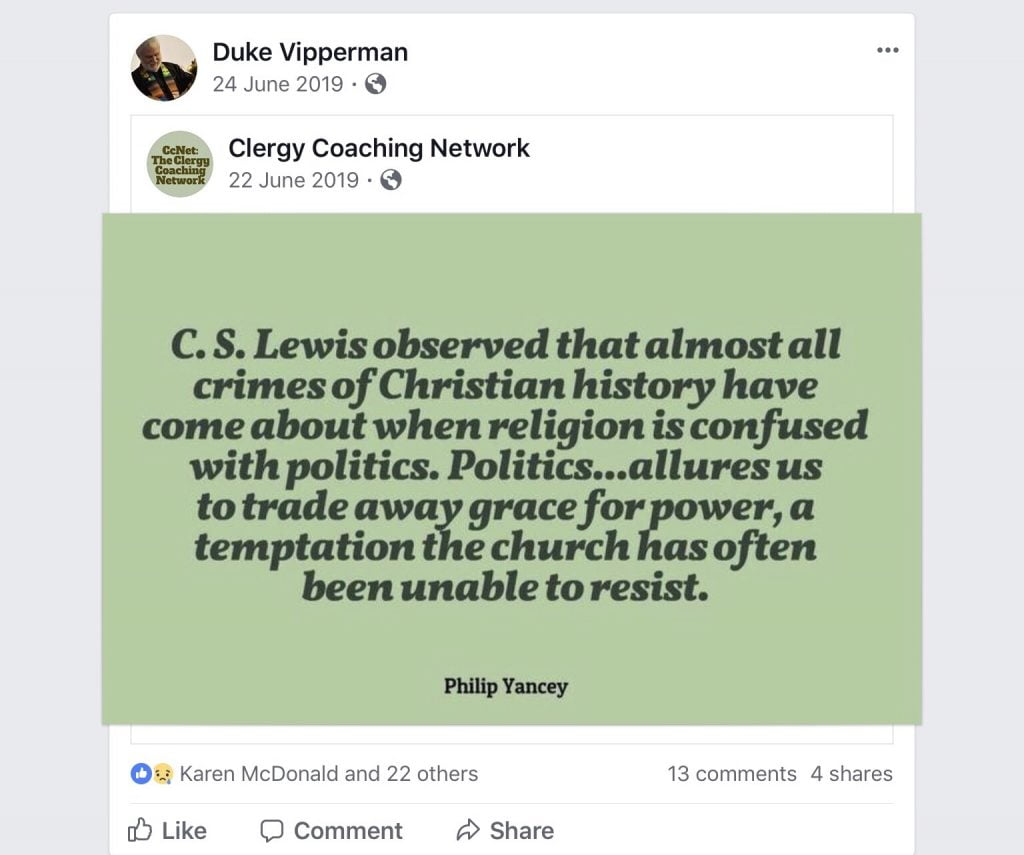
Clergy Coaching Network. 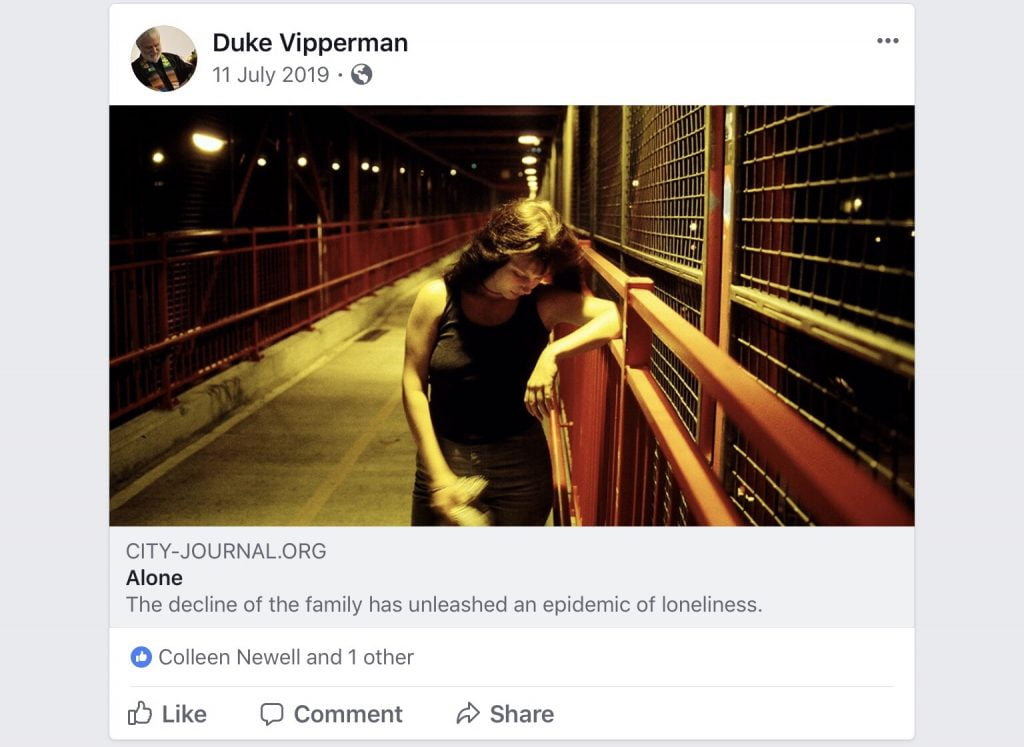
The decline of the family has unleashed an epidemic of loneliness 
Recent scorching temperatures in Kuwait and Pakistan confirmed as third and fourth hottest on Earth 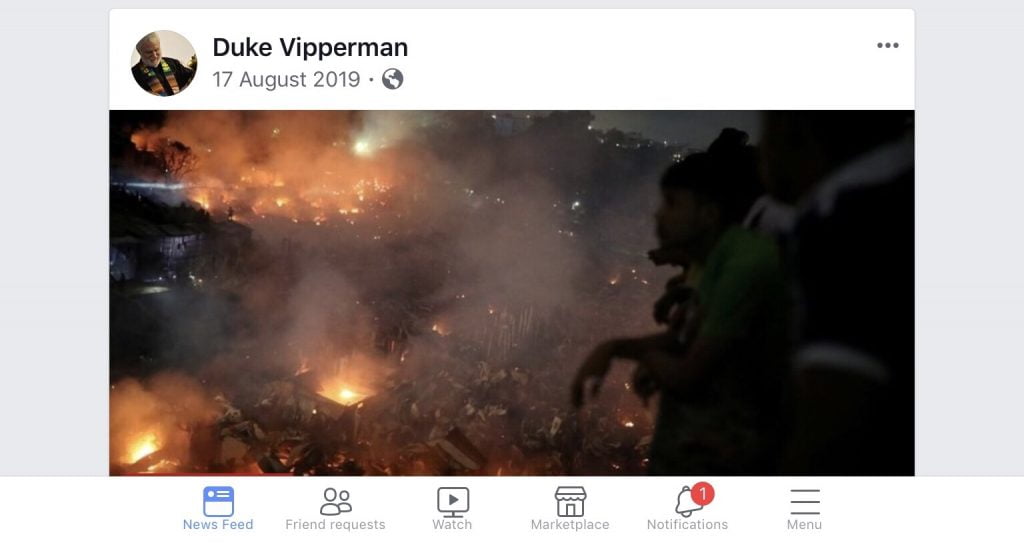
BBC News: Slum fire leaves 50,000 homeless in Bangladesh 
Wunderground.com: Europe Awaits Record-Smashing June Heat Wave by Bob Henson | Category 6 
YouTube: Amazon on fire 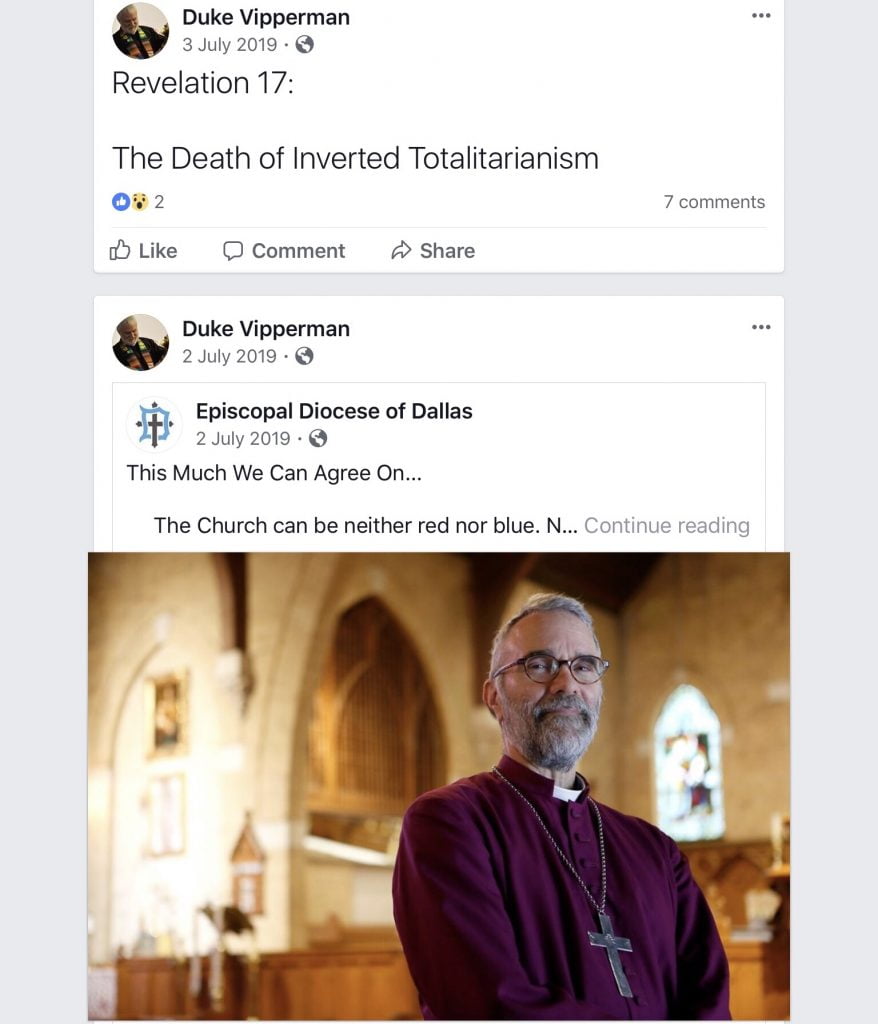
Revelation 17: The Death of Inverted Totalitarianism and below The Church can be neither red nor blue. 
Immigration makes Canada great. 
CBC: Canada resettled more refugees than any other country in 2018, UN says. 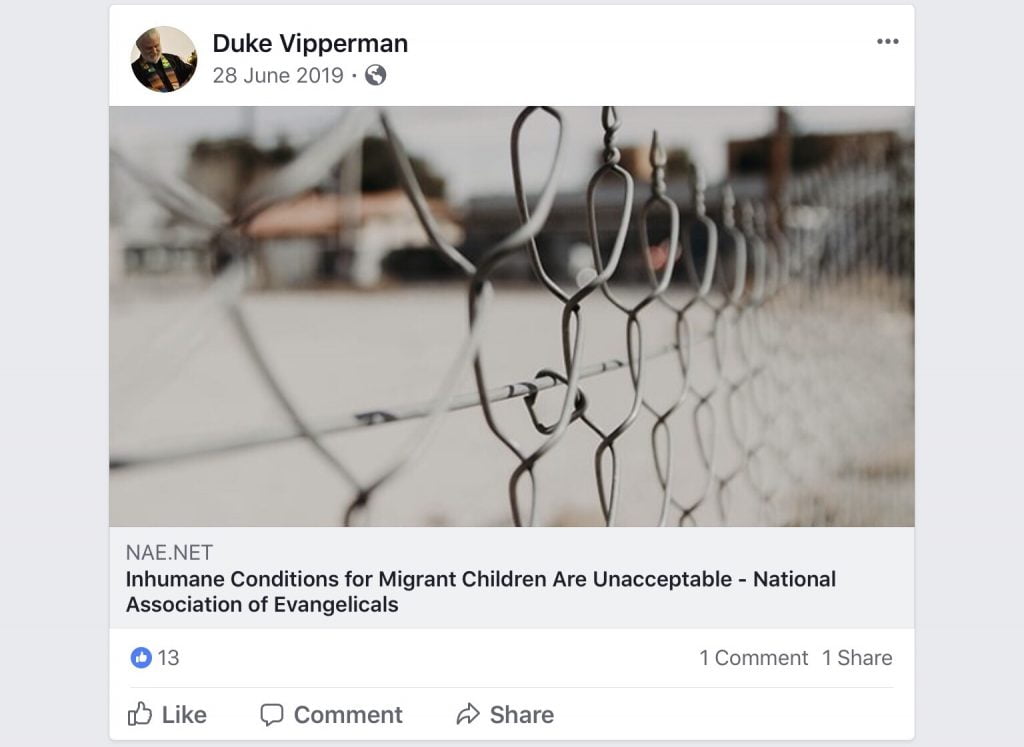
NAE.NET: Inhumane conditions for migrant children are unacceptable. 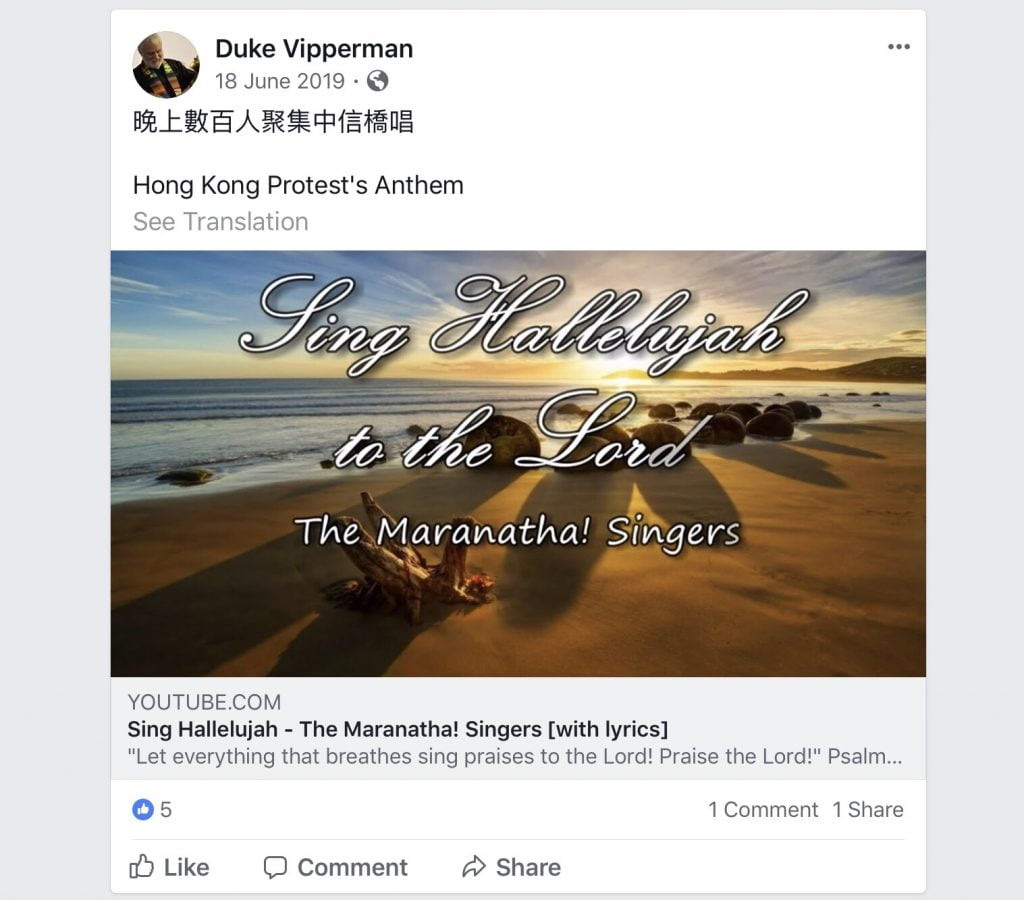
Hong Kong Protest’s Anthem 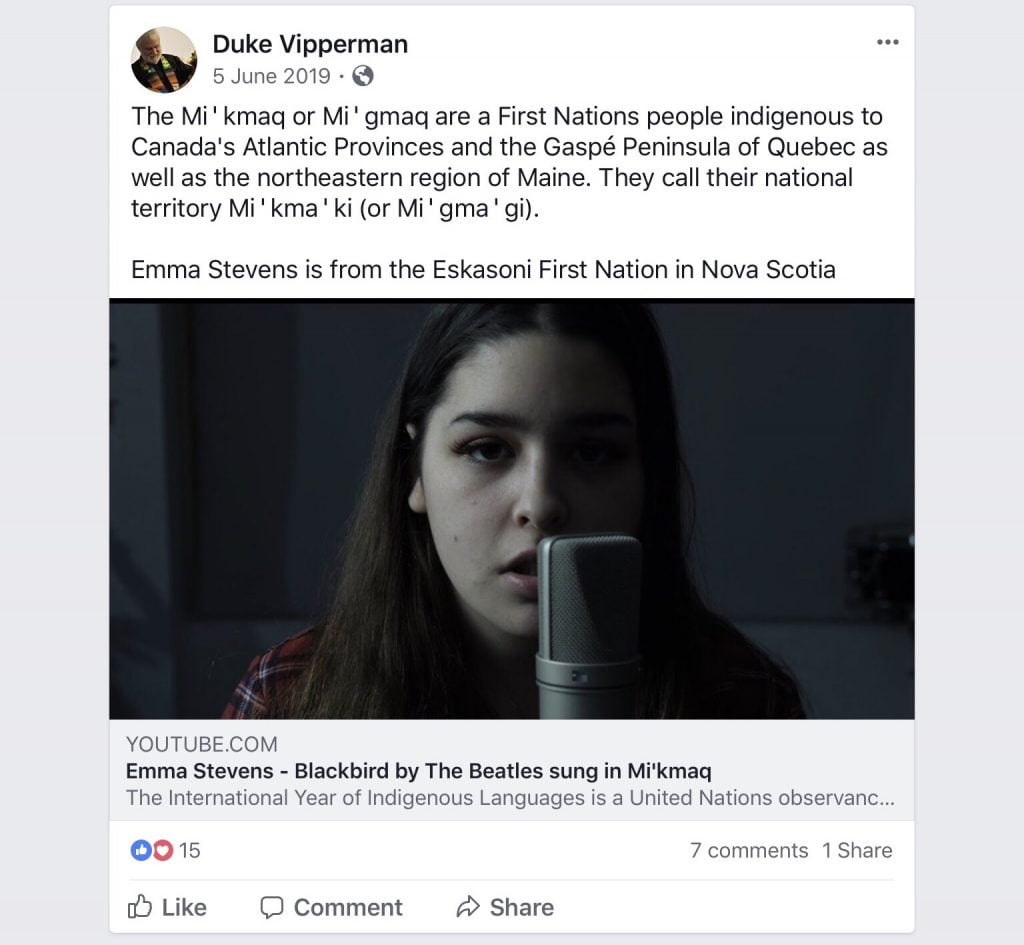
The Mi’kmaq or Mi’gmaq are a First Nations people indigenous to Canada’s Atlantic Provinces . . . Emma Stevens is from the Eskasoni First Nation in Nova Scotia
I’m reading Surprised by Hope today in January 2020, the whole thing, because at last in 2020, I can. I began reading it the day before my Pastor died. It’s become my homage to Duke.
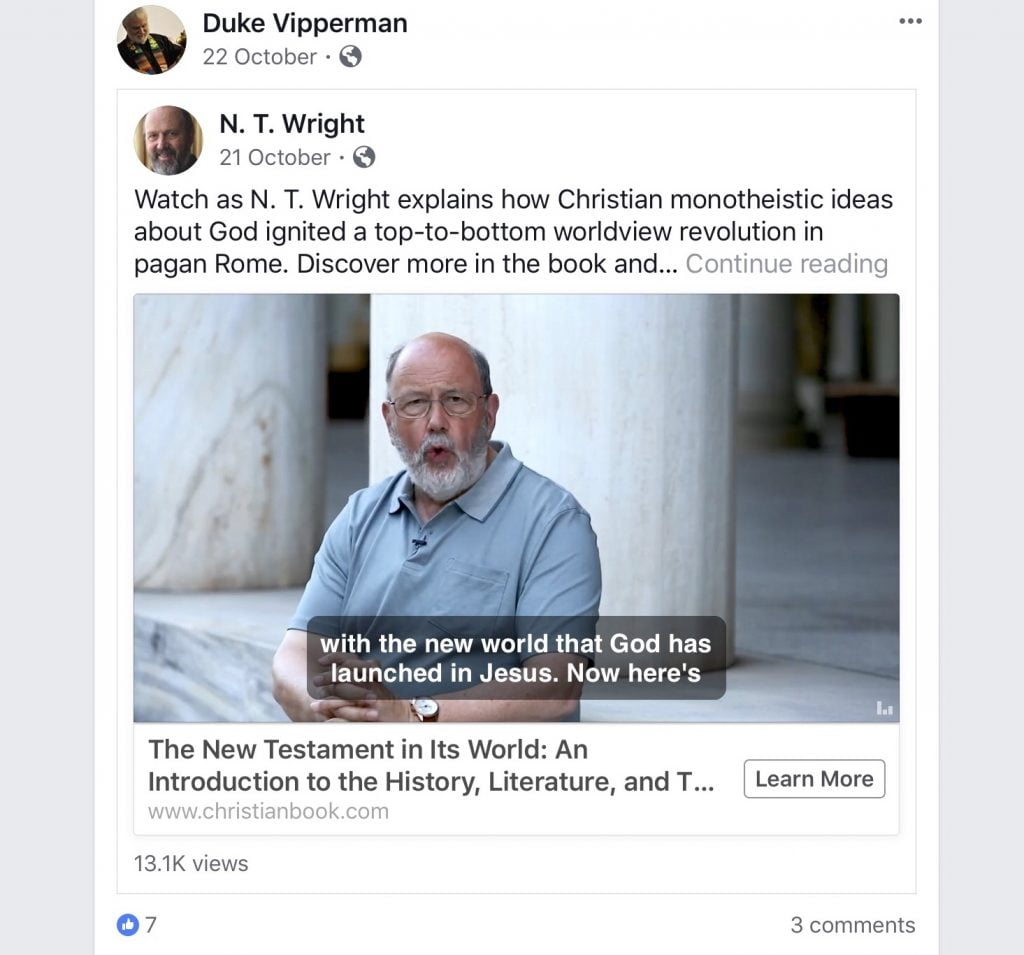
The New Testament in Its World: An Introduction
Watch as N.T. Wright explains how Christian monotheistic ideas about God ignited a top-to-bottom worldview revolution in pagan Rome. Discover more in the book and . . .
22 October 2019




